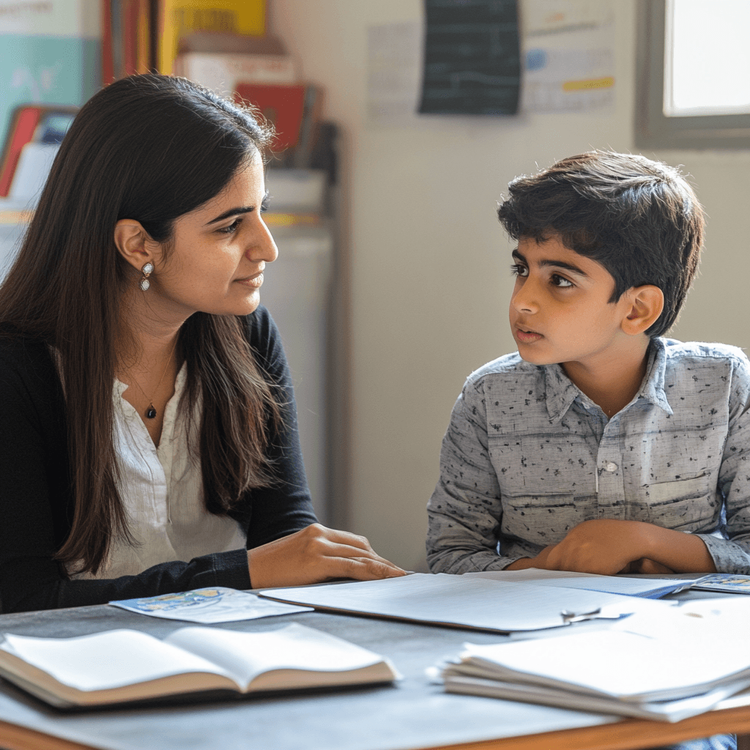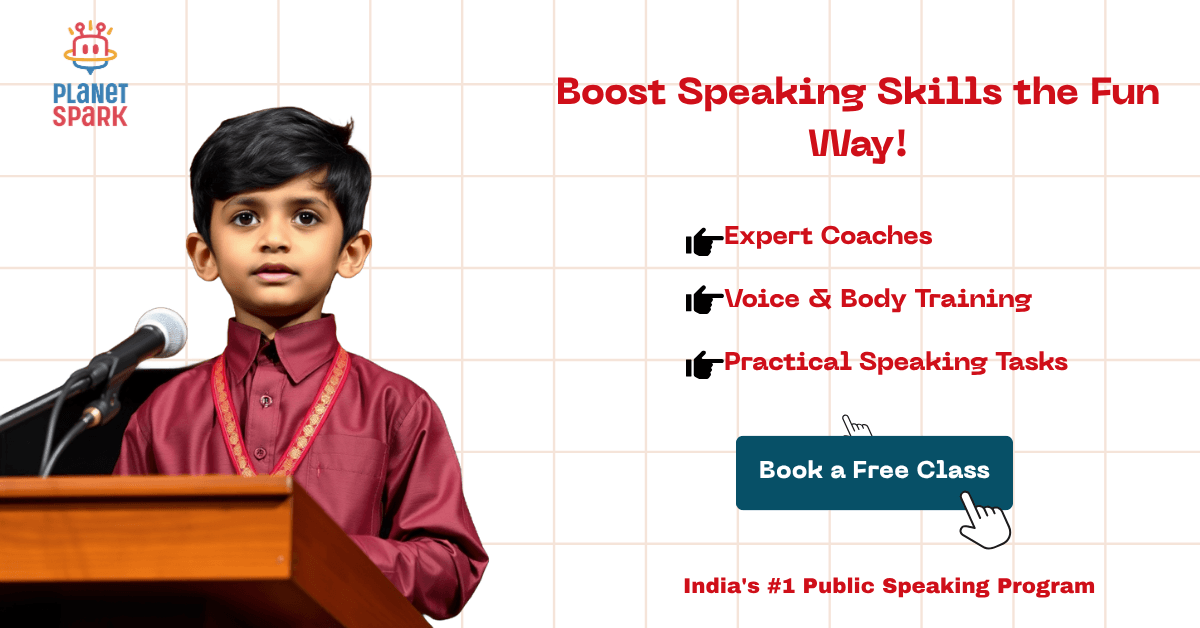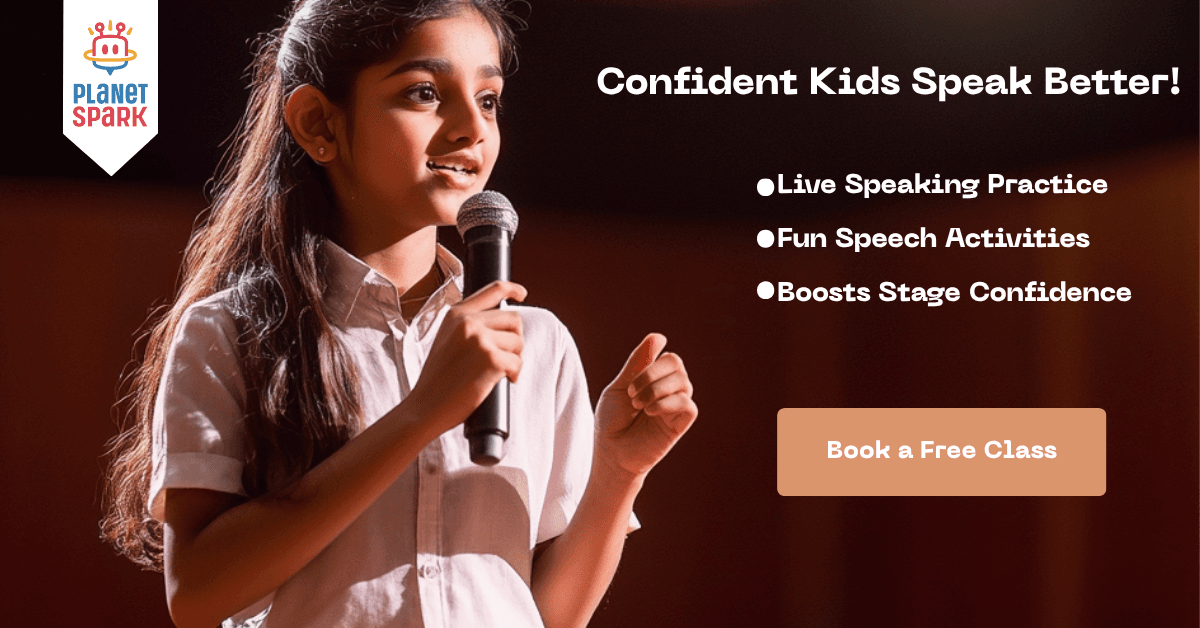Effective Ways to Improve Public Speaking for Kids

Table of Contents
- What is Public Speaking
- Everyday Public Speaking
- Why Public Speaking for Kids Matters
- How to Improve Public Speaking for Kids
- Topics and Tips for Practicing
- Advantages of Public Speaking for Kids
- Real-Life Benefits of Public Speaking for Kids
- Parent & Educator Support
- Public Speaking Courses by Communication Experts
- Step-by-Step Skill Building
- TED-Style Training Modules
- Real-Time Practice with Global Peers
- Video Feedback Loop with AI Analysis
- Conclusion
- FAQs:
Most of us feel butterflies when called upon to speak in public. It’s natural for kids too to feel nervous at the thought of addressing a room full of people. This is why it is essential to enhance public speaking for kids in their elementary years - giving them ample time to develop confidence and mastery. Having excellent communication skills will take your child a long way. Communication is the backbone of society, and mastering public speaking for kids helps them build connections, enhance relationships, and even drive positive change.
Before diving into ways to improve public speaking for kids, let’s first define what public speaking means and why it’s so powerful.
What is Public Speaking
At its essence, public speaking is expressing your ideas in front of people in an organized and meaningful way. Merriam‑Webster puts it as "the art of effective oral communication with an audience." It is anything from presenting a school project to presenting stories or speeches. Early public speaking training for children is essential - children learn how to sequence thoughts and engage audiences, putting them ahead early compared to their peers.
Learning public speaking at an early age gives children the most important tools: cogency of mind, persuasive speech, and emotional control during pressure situations. It also teaches them how to adapt their message to the audience, predict reactions, and adjust their speech to that effect - an advanced but critical communication skill.
Kids' public speaking is more than performing on a stage with a mic. It is a part of everyday life, like greeting people, questioning confidently in class, or reading aloud a story during show-and-tell. These daily habits build up to larger speaking roles in later years.
When developed with a positive, supportive attitude, public speaking is a rewarding and enjoyable experience. Well-spoken children feel more confident and tend to become more active in school functions, contests, and leadership activities. This confidence carries over to academics, friendships, and later, career choices - showing that public speaking is not only a skill, but a life superpower.
Everyday Public Speaking
Public speaking is more than formal presentations - it's embedded in everyday life. Children engage in public speaking the moment they speak to inform, persuade, or entertain others. Recognizing and utilizing these everyday moments helps develop a strong speaking foundation from a young age.
Informative speaking: Explaining ideas in class, summarizing a story at home, or sharing facts with friends helps children organize their thoughts and speak clearly. For example, describing what they learned in science class or teaching a younger sibling how to play a game builds both comprehension and confidence. This daily practice improves their ability to explain topics in front of larger audiences.
Persuasive speaking: Trying to convince parents of a pet, persuading friends to play a favorite game, or explaining why their idea is better during group activities are real-life exercises in persuasive communication. These situations train kids to present logical arguments, listen to counterpoints, and respond with clarity and confidence - essential elements of effective public speaking for kids.
Entertaining speaking: Whether reciting a funny poem, mimicking cartoon voices, or telling stories during a sleepover, kids naturally entertain. Encouraging them to take the spotlight boosts stage presence, tone modulation, and emotional expression.
These daily opportunities not only reinforce communication skills but also help children develop audience awareness, vocabulary, and storytelling techniques, making public speaking for kids a fun, natural process of self-expression and confidence-building.
Why Public Speaking for Kids Matters
Influence Their Audience
Teaching children early how to express ideas clearly and persuasively enhances their ability to influence others positively, be it in school debates, group decisions, or community events.
Build Leadership
Public speaking exhibits courage and leadership. When children learn to speak confidently, they step into leadership roles naturally - whether as team captains or peer supporters.
Boost Communication Skills
Public speaking for kids improves both verbal and non‑verbal skills, such as voice modulation, eye contact, and body language, making them more effective communicators overall.
Inform More Effectively
By practicing speeches and presentations, children learn how to hold attention and deliver information in an engaging way - skills that benefit them academically and socially.
Enhance Social Skills
Public speaking builds interpersonal abilities such as empathy, listening, and interactive communication. It prepares children to connect with diverse individuals comfortably and respectfully.
Prepare for Future Success
Whether it’s school, college, or professional paths, strong public speaking skills for kids build a foundation for interviews, presentations, and leadership roles, ensuring they’re never hesitant to voice their ideas.

How to Improve Public Speaking for Kids
Ensure consistent, enjoyable practice:
1. Games and Activities
Connect the nouns: Kids craft stories using random words.
Speak your mind: Encourage free-form speaking on random topics.
Describe what you see: Develop clarity and vocabulary.
Make up a definition: Improves spontaneity and presence.
Create alternative endings: Fosters imagination and structure in speech.
These games enhance improv skills, storytelling ability, and audience connection - all core to public speaking for kids.
2. Apps and Tech Tools
Orai: Real-time feedback on clarity and projection.
Six Minutes: Vocabulary and grammar boosts.
Zoom: Group practice and peer support.
BookWidgets: Interactive quizzes that build oral expression.
SpeakerClock: Time‑management for paced delivery.
Ummo: Improves pause use and eliminates filler words.
Tech enables regular, measurable progress in public speaking for kids.
3. Watch TED Talks
TED Talks inspire with a variety of styles and techniques. Encourage children to analyze tone, body language, and storytelling. Watching kids speak at TEDx events further motivates me.
4. Learn from Movies
Movies teach sequencing, tone, and descriptive skills. Try:
The King’s Speech – Overcoming Fear
Larry Crowne – Engaging humor
Kid President – Confident, child-led presentation
My Fair Lady – Persistence and Voice Control
These examples support public speaking for kids' training through observation and practice.
5. Join Public Speaking Courses
Professional courses provide structured improvement: interactive sessions, peer feedback, and expert guidance in public speaking for kids. These foundations instill lifelong confidence and communication excellence.
Topics and Tips for Practicing
Encourage practice with engaging topics:
My Dream Career
If I Were President
Best Day of My Life
Favorite Pastime
One Change I'd Make at School
Why Sports Matter
If Animals Could Speak
If I Held a Superpower
What I Love About My Parents
My Favorite Food
If I Could Choose a Planet
What My Dog is Thinking
Preparation Tips
Use voice modulation
Control tone and pace
Speak clearly and confidently
Maintain eye contact
Practice positive body language
Visualize success
These focus areas support strong public speaking habits for kids' habits.
Advantages of Public Speaking for Kids
1. Overcoming Fear
Group activities and real audiences help reduce stage fear through safe practice. Children become accustomed to speaking in front of others, learning to handle nervousness gradually. Repeated exposure builds resilience, making them more comfortable over time. Supportive feedback from teachers and peers also plays a crucial role in building their self-assurance.
2. Express Opinions
Children who can speak confidently don’t shy away from sharing ideas, and building self‑assertion, and independence. Public speaking teaches them how to structure their thoughts, use persuasive language, and communicate with clarity. As they learn to express their views, they also become more active in discussions, debates, and real-world decision-making situations.
3. Improve Academics
Confidence in speaking encourages classroom participation. Active learning improves when students speak up and ask questions. Children who feel empowered to share their thoughts are more likely to engage in group work, give presentations, and lead projects. Their verbal skills enhance reading comprehension, critical thinking, and performance across academic subjects.
4. Develop Self-Control
In public speaking, children learn to think before speaking and manage their emotions, benefiting all social interactions. They become more mindful of their tone, pace, and body language. These skills help them stay composed during disagreements, navigate social situations with ease, and foster empathy by listening actively to others’ viewpoints.

Real-Life Benefits of Public Speaking for Kids
Academic Success: The Kid is less afraid to ask and answer in class.
Personal Growth: Self‐esteem increases with each successful speech.
Social Confidence: Kids make friends, join clubs, and step into leadership roles.
Career Readiness: Interviews become less intimidating, pitches more persuasive, and leadership roles more accessible.
Public speaking for kids fosters well-rounded development that extends into adulthood.
Parent & Educator Support
To amplify growth:
Praise effort and progress, not perfection.
Offer constructive feedback on voice, structure, and posture.
Stage mini-events at home - family “talk shows” or pretend classrooms.
Provide peer sessions, encouraging kids to present to each other.
Create fun rewards, like certificates, for speaking milestones.
This support system empowers early growth in public speaking for kids.
Public Speaking Courses by Communication Experts
One of the most effective ways to master public speaking for kids is through expert-led coaching. At PlanetSpark, every child receives personalized coaching from communication experts who are not only certified in public speaking and training but also well-versed in child psychology. This allows for a customized learning experience that considers each child's strengths, areas for improvement, and pace of learning.
Through 1:1 mentoring, children gain the confidence to speak up, the techniques to structure ideas effectively, and the expressive skills to engage any audience. Our communication coaches provide detailed feedback, making children feel supported, motivated, and empowered.
Step-by-Step Skill Building
The PlanetSpark curriculum is designed to gradually develop fluency and eloquence through a structured skill-building program. Children are taught to master every element of public speaking for kids, including:
- Body Language: From maintaining eye contact to mastering stage posture and hand gestures.
- Voice Modulation: Using intonation, pitch, and pauses to make speech more engaging and persuasive.
- Speech Structuring: Organizing thoughts logically using frameworks like “introduction-body-conclusion” and storytelling arcs.
- Storytelling & Persuasive Speech: Learning how to weave narratives, use rhetorical appeals (ethos, pathos, logos), and respond to counterarguments in debates.
Children also engage in debating formats like mock parliaments, turncoat debates, and group panel discussions - training them to agree or disagree respectfully, form strong rebuttals, and think critically under pressure.
TED-Style Training Modules
Inspired by TEDx speakers, children are introduced to advanced public speaking techniques for kids like the “Hook-Message-Story-Call-to-Action” framework. This not only teaches them how to structure a compelling speech but also helps them express original ideas with impact.
Real-Time Practice with Global Peers
PlanetSpark offers a global learning environment where students from 13+ countries interact via live sessions, storytelling rounds, and friendly competitions. These group settings allow kids to observe peers, receive real-time feedback, and engage in meaningful exchanges, making public speaking for kids more dynamic and culturally inclusive.
Video Feedback Loop with AI Analysis
Every child receives video recordings of their speeches to review with their coach. In addition, AI-powered tools provide precise analytics on pauses, voice clarity, and keyword emphasis. This ensures children not only practice but also reflect and refine their delivery with measurable feedback. Parents receive detailed progress reports after every major activity, keeping them involved in their child’s communication journey.
Conclusion
Public speaking isn’t just an academic subject - it’s an essential life skill, and developing public speaking for kids early supports their emotional, academic, and social development. Techniques like interactive games, tech tools, watching inspirational speakers, and structured courses foster lifelong communication strengths.
With structured support from parents, teachers, and experts, children can learn to present with clarity, empathy, and confidence. Equip your child today, and they’ll thank you tomorrow for giving them a voice with which they can take on the world.
FAQs:
1. Why is public speaking important for kids?
Ans. Public speaking for kids helps build confidence, enhances communication skills, and prepares them for academic and social success. It teaches children how to express their thoughts clearly and engage with others effectively.
2. At what age should kids start learning public speaking?
Ans. Kids can start developing public speaking skills as early as age 4–5. At this stage, children begin forming sentences and can benefit from simple speaking activities that improve verbal expression and confidence.
3. What are some fun ways to improve public speaking for kids?
Ans. Games like "Describe What You See," storytelling, role-play, and impromptu speeches are effective ways to improve public speaking for kids. These activities make learning engaging while boosting self-expression.
4. Can public speaking courses help shy kids?
Ans. Yes, public speaking courses are especially beneficial for shy kids. These programs use structured, supportive environments to help children overcome fear, gain confidence, and enjoy speaking in front of others.
Personalized Communication Report
Record a video to get a AI generated personalized communication report for your child

Hi There, want to try these
tips for your child with
LIVE with our expert coach?
Let's check your child's
English fluency
